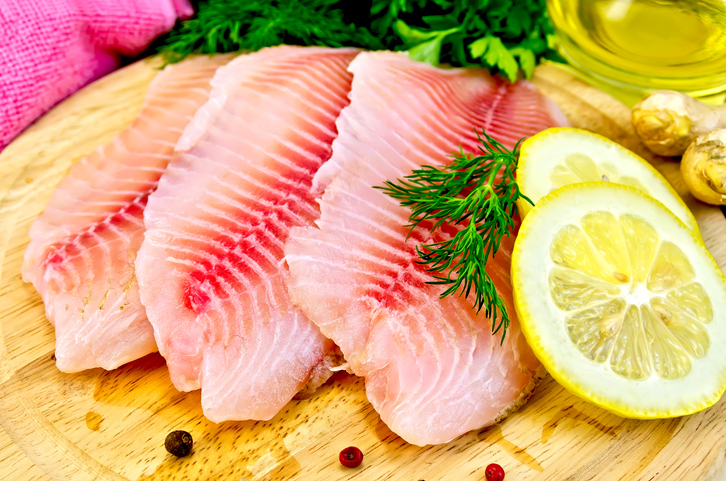
Tilapia is now the fourth most-consumed seafood in the United States, after shrimp, tuna and salmon. This is largely due to it being inexpensive and light, flaky taste that can be easily used in a number of dishes.
RELATED: The 5 Best Types Of Seafood
Due to increased demand, much of the tilapia consumed by the public is now farm-raised rather than wild-caught. Now, a post making its rounds on Facebook is saying a lot of bad things about tilapia, but are the claims true?
The post makes three big claims:
- Tilapia can't be found in the wild, but only in fish farms.
- That it is worse for you than bacon or hamburgers.
- It contains dioxin, a cancer causing chemical.
But here's the truth.
Myth #1: Tilapia Can't Be Found In The Wild
Tilapia can be found inthe wild, but it's not a single type of fish. Instead, it’s the name for nearly a hundred species of fish commonly found in Africa and the Middle East.
Myth #2: Tilapia Is As Bad As Bacon
In comparison to bacon, it is low calorie and low fat. It is also low in omega- 3, but that doesn’t mean it's bad for you. The comparison came from the fact that tilapia raised on farms in China and Central America, which account for three-fourths of the tilapia we get, has very high levels of omega-6 fatty acids and negligible omega-3s (due to the fish's diet).
Unlike omega-3s, which tame inflammation and promote heart and brain health, omega-6s may increase inflammation, but only when they're consumed in excess of omega-3s. In other words, omega-6s themselves aren't bad for you.
But when your fatty acid ratio falls out of whack, "omega-6s are converted to pro-inflammatory messengers that orchestrate diabetes, stroke, heart disease, arthritis, and even Alzheimer's," says Floyd Chilton, director of the Wake Forest Center for Botanical Lipids and Inflammatory Disease Prevention.

Therefore, Chilton insists lean, protein-rich tilapia shouldn't bebranded "unhealthy" just because it's high in omega-6s. Choosing this fish isn't necessarily a bad thing, but if you're eating fish mainly to reap the benefits of omega-3s, you can do a lot better than tilapia. "The big winners are salmon, mackerel, albacore tuna, and trout, which give you more than a gram of omega-3s per 3 ounces," Chilton says.
Myth #3: Tilapia Can Cause Cancer
When it comes to dioxins, tilapia is like a lot of farmed fish. So, it depends on where it was raised. If you are concerned about contamination, look on the label for fish raised in the U.S.
Although there are some highly reputable global producers that grow healthy fish in an environmentally sound fashion — namely the world's largest producer, Regal Springs — there are many farmers, especially in Asia, that do not.
Many foreign producers in under-regulated nations have been found to raise diseased tilapia in too-tight quarters, pumping fish full of antibiotics, clearing forests to make room for on-shore tanks, and even feeding fish feces. Such measures not only yield poor-quality fish but can cause major damage to the surrounding land and water.
RELATED: What Happens To Your Body When You Eat Too Much Seafood
To ensure that we receive safe, healthy tilapia that's also been farmed responsibly, there are now more checks and balances in place that go far beyond the Food and Drug Administration's spot-testing of tilapia shipments for traces of unapproved antibiotics and environmental toxins.
The U.S. government–run NOAA Fisheries Office of Aquaculture inspects foreign fish-processing plants for safety and sanitation at the request of either U.S. buyers or the producers. Global Aquaculture Alliance, a nonprofit trade organization, certifies operations that follow strict ecological standards.
RELATED: 3 Heart-Healthy Benefits of Eating Salmon
There is also the Aquaculture Stewardship Council (ASC), which since 2011 has been auditing and certifying tilapia farms that make the grade for production standards and environmental and social impacts. Only about 15 percent of the tilapia available in the U.S. carries the ASC seal, one of the best indicator of safe, responsibly raised tilapia. So if you're looking for good, healthy tilapia, look for it with this seal. If you get it from the seafood counter at your local grocery story, ask to see if their tilapia packaging has the seal.
 Fish, for the most part, is seen as that food that is healthy for your body and mind. It's a low fat, high in protein food and has a wide variety of health benefits. However, all fish doesn't fall in that category.
Fish, for the most part, is seen as that food that is healthy for your body and mind. It's a low fat, high in protein food and has a wide variety of health benefits. However, all fish doesn't fall in that category.
Fish can either be one of the best foods for you or detrimental to your health, depending on where it comes from. There is a world of difference between fish that is caught in the wild, farm-bred or farm-raised fish. The most common farm-raised fish are: salmon, tilapia, sea bass, catfish and cod.
RELATED: Top 3 Mistakes Cooking Salmon (You Should Never Make Again)
Farm-raised tilapia has always been a popular source for fish, not only because it is widely available in the U.S., but it is also very inexpensive. However, before you stock up on tilapia, you may want to know about its correlation to inflammation. According to recent studies, eating farm-raised tilapia may worsen inflammation that can lead to heart disease, arthritis, asthma and a host of other serious health problems. People who resort to eating more fish as a way to get their dose of omega-3-fatty-acids and lessen their risk of heart attacks may want to hold off on the tilapia. In fact, some scientists have found that the inflammatory potential of tilapia is far greater than that of a hamburger or pork bacon!
Apparently, chicken feces is one of the main ingredients that go into farm fish feed. Not only that, the transfer of...
...pig and duck waste to fish farms is also a very common practice.
Farm-bred fish have been found to have high concentrations of antibiotics and pesticides. To keep them alive, farm owners give antibiotics to the fish to keep away disease. Farm-bred fish are also treated with pesticides to combat sea lice.
RELATED: The Truth About Dietary Supplements
Farm-bred fish also have lower levels of healthy nutrients. Many of us consume fish, hoping to reap the omega-3 fatty acid benefits that come with it. However, did you know that the omega-3-acids that are found in farm-raised fish are less usable to our bodies compared to wild bred fish? Farm-raised fish also has a lower protein content. Not only that, because farm-raised fish are kept in cages, they have the tendency to be fattier, and can have a higher concentration of omega-6 acids. The problem with getting too much omega 3 and omega 6 acids is that they may cause inflammation to the body.
These are only some of the dangers that have been linked back to eating farm-raised fish. What does this tell us? The biggest lesson that we can get from this is that we should find out where our fish is coming from. Not all fish are created equal, and sad to say, farm-raised fish, instead of helping us, may even harm us.
Fish can be an incredible health-building food if you go with wild -caught fish, like sockeye salmon. It’s loaded with the omega-3 fats EPA and DHA and has incredible health benefits.









